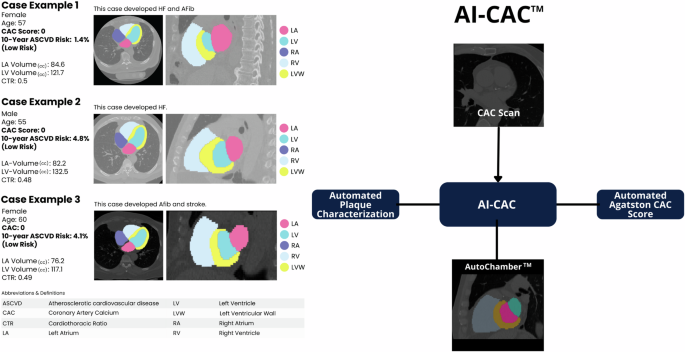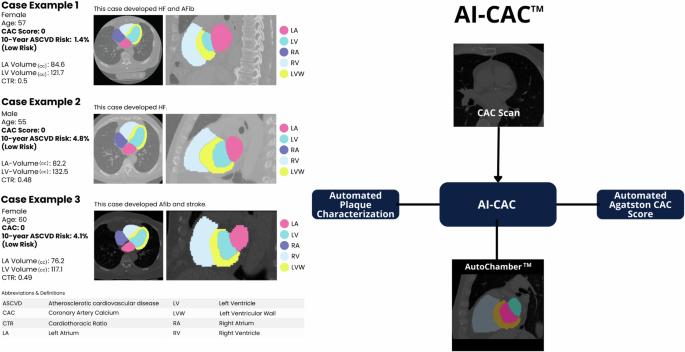将人工智能应用于冠状动脉钙扫描(AI-CAC)可显著提高心血管事件预测能力。
IF 15.1
1区 医学
Q1 HEALTH CARE SCIENCES & SERVICES
引用次数: 0
摘要
冠状动脉钙化(CAC)扫描所包含的宝贵信息超出了阿加斯顿评分(Agatston Score)的范围,目前报告的阿加斯顿评分仅用于预测冠心病(CHD)。我们研究了应用于 CAC 扫描的新型人工智能(AI)能否预测非慢性疾病事件,包括心力衰竭、心房颤动和中风。我们对多种族动脉粥样硬化研究中的 5830 名无症状者(52.2% 为女性,年龄为 61.7 ± 10.2 岁)的 CAC 扫描(AI-CAC)应用了人工智能支持的自动心腔容积测量和钙化斑块特征描述,在 15 年的随访期间,共发生了 1773 起心血管疾病事件。在 1、5、10 和 15 年的随访中,AI-CAC 与 Agatston 评分的 AUC 分别为 (0.784 vs. 0.701)、(0.771 vs. 0.709)、(0.789 vs. 0.712) 和 (0.816 vs. 0.729) (p本文章由计算机程序翻译,如有差异,请以英文原文为准。


Artificial intelligence applied to coronary artery calcium scans (AI-CAC) significantly improves cardiovascular events prediction
Coronary artery calcium (CAC) scans contain valuable information beyond the Agatston Score which is currently reported for predicting coronary heart disease (CHD) only. We examined whether new artificial intelligence (AI) applied to CAC scans can predict non-CHD events, including heart failure, atrial fibrillation, and stroke. We applied AI-enabled automated cardiac chambers volumetry and calcified plaque characterization to CAC scans (AI-CAC) of 5830 asymptomatic individuals (52.2% women, age 61.7 ± 10.2 years) in the multi-ethnic study of atherosclerosis during 15 years of follow-up, 1773 CVD events accrued. The AUC at 1-, 5-, 10-, and 15-year follow-up for AI-CAC vs. Agatston score was (0.784 vs. 0.701), (0.771 vs. 0.709), (0.789 vs. 0.712) and (0.816 vs. 0.729) (p < 0.0001 for all), respectively. AI-CAC plaque characteristics, including number, location, density, plus number of vessels, significantly improved CHD prediction in the CAC 1–100 cohort vs. Agatston Score. AI-CAC significantly improved the Agatston score for predicting all CVD events.
求助全文
通过发布文献求助,成功后即可免费获取论文全文。
去求助
来源期刊

NPJ Digital Medicine
Multiple-
CiteScore
25.10
自引率
3.30%
发文量
170
审稿时长
15 weeks
期刊介绍:
npj Digital Medicine is an online open-access journal that focuses on publishing peer-reviewed research in the field of digital medicine. The journal covers various aspects of digital medicine, including the application and implementation of digital and mobile technologies in clinical settings, virtual healthcare, and the use of artificial intelligence and informatics.
The primary goal of the journal is to support innovation and the advancement of healthcare through the integration of new digital and mobile technologies. When determining if a manuscript is suitable for publication, the journal considers four important criteria: novelty, clinical relevance, scientific rigor, and digital innovation.
 求助内容:
求助内容: 应助结果提醒方式:
应助结果提醒方式:


